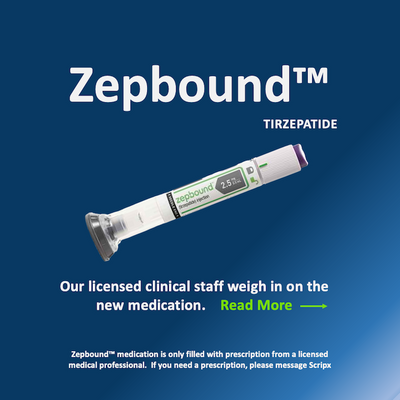
The Newest Weight Loss Medication: Zepbound
When it comes to weight loss, more options mean greater opportunities to discover what works for you, and now there’s a significant new choice in the medication lineup: Zepbound.™
Although medications like Ozempic® (semaglutide) and Mounjaro® (tirzepatide) can both be used for weight loss, those drugs are approved by the U.S. Food and Drug Administration (FDA) for type 2 diabetes. Only a few other medications—among them Wegovy,® which is also semaglutide-based, and Saxenda® (liraglutide)—have garnered FDA approval specifically for weight loss.
Fresh on the roster for FDA-approved weight loss medication is Zepbound. Developed by Eli Lilly, the same manufacturer that produces Mounjaro, this medication’s approval was based on results from multi-phase clinical trials. In that research, participants on the highest dose lost on average 48 pounds over 72 weeks—about half a pound per week—the kind of gradual progress that's crucial for long-term weight management. On the lowest dose, people taking Zepbound for weight loss lost on average 34 pounds.
According to Eli Lilly, Zepbound is expected to be available in the U.S. before the year’s end in different dose amount options. The big question many will ask is likely: How is Zepbound different from Wegovy?
The answer is that similar to the type 2 diabetes drug Mounjaro, Zepbound features a dual mechanism that contributes to weight loss. One has been shown to decrease food intake and increase energy expenditure, while the other helps regulate blood glucose levels and appetite, contributing to weight loss. Wegovy and Ozempic use a single mechanism mimicking a hormone called glucagon-like peptide-1. They promote weight loss by slowing digestion, causing people to feel fuller longer after eating and curbing appetite.
That doesn't mean one drug is better than the other. This just means you'll have more options to find a medication that's a good fit for you.
What Is Zepbound?
A few important highlights you should know about Zepbound (tirzepatide) are:
- The U.S.-based pharmaceutical company Eli Lilly manufactures Zepbound.
- It is a once-weekly injectable medication.
- The FDA approved the medication in early November.
- Although Mounjaro’s active ingredient is also tirzepatide, it’s FDA-approved for treating type 2 diabetes (but can be prescribed off-label for weight loss); the FDA specifically approved Zepbound for weight loss as a treatment for obesity and overweight.
- It is the first and only obesity treatment with a dual-targeted mechanism, relying on a glucose-dependent insulinotropic polypeptide (GIP) receptor agonist and glucagon-like peptide-1 (GLP-1) receptor agonist.
Why does this combination matter? In an April 2022 press release about tirzepatide—the active ingredient in Zepbound with the exact dual mechanism—Eli Lilly explained why these two mechanisms are so important. According to the release, the GIP hormone receptor agonist complements the GLP-1 hormone receptor agonist in a novel way: “GIP has been shown to decrease food intake and increase energy expenditure, resulting in weight reductions, and when combined with a GLP-1 receptor agonist, may result in greater effects on markers of metabolic dysregulation such as body weight, glucose and lipids.” This means the two incretin hormone agonists work together to help maintain weight loss by regulating blood glucose levels and appetite, aiding body fat reduction.
But what are incretin hormones? After eating, your gut naturally releases incretin hormones—the two main ones are GIP and GLP-1. These hormones help regulate the insulin the pancreas releases to keep blood sugar levels under control effectively. More than that, the GLP-1 incretin hormone improves satiety and helps slow stomach emptying, causing you to feel fuller longer.
But those with excess weight or obesity can become insulin resistant—meaning their body doesn’t respond to the hormone’s signaling. This can result in too much glucose in the blood. Insulin resistance can lead to type 2 diabetes, weight gain, and elevated blood sugar levels.
"Unfortunately, despite scientific evidence to the contrary, obesity is often seen as a lifestyle choice—something that people should manage themselves," said Dr. Leonard Glass, senior vice president global medical affairs, Lilly Diabetes and Obesity, in the November 2023 announcement on Zepbound. "For decades, diet and exercise have been a go-to, but it's not uncommon for a person to have tried 20-30 times to lose weight with this approach. Research now shows that the body may respond to a calorie-deficit diet by increasing hunger and reducing feelings of fullness, making weight loss more difficult."
Using a medication like Zepbound for weight loss offers more options, particularly because it counteracts this inclination toward reduced fullness and increased hunger.
Is Zepbound effective for weight loss?
Eli Lilly noted that FDA approval was based on results from the phase 3 SURMOUNT-1 and SURMOUNT-2 trials. In SURMOUNT-1, a study in 2,539 adults with obesity, or excess weight and weight-related conditions (but not type 2 diabetes), people taking Zepbound as an adjunct to diet and exercise experienced substantial weight loss compared with placebo at 72 weeks. At the highest dose (15 mg), people taking Zepbound lost on average 48 pounds, while at the lowest dose (5 mg), people lost on average 34 pounds (compared to just 7 pounds on the placebo).
Additionally, 1 in 3 patients taking Zepbound at the highest dose lost over 58 pounds (25% of body weight), compared to 1.5% on placebo. The average starting weight was 231 pounds.
While Zepbound was not approved to treat cholesterol, high blood sugar or waist size, these health indicators improved in a clinical trial among people with weight-related medical conditions who dieted, exercised, and took Zepbound for weight loss, according to a November 2023 news release from Eli Lilly.
Is taking Zepbound for weight loss right for you?
Fewer than one percent of medical providers have the right training to help you choose the proper medication for your weight loss journey. If you’re considering weight loss with Zepbound, GLP-1s, or any other medications for weight loss, consult an obesity-trained specialist first, such as those at Scripx Health. Remember to pair medication with lifestyle changes for sustainable weight loss.
Aside from your unique biology and medication needs, you'll want to consider a few factors before asking a provider about Zepbound.
How much does Zepbound cost?
According to Lilly’s list price, Zepbound costs $1,059.87 per four-week fill. The company notes the amount you pay will largely depend on your prescription drug insurance plan.
One option to consider is the Zepbound Savings Card Program from Eli Lilly. Although the manufacturer has yet to roll this out, the company notes the program will be available within days of product availability in U.S. pharmacies.
It’s worth noting that people across the U.S. have seen a decline in pharmaceutical coverage for GLP-1 receptor agonist medications in the last few months as insurers struggle to cover the demand for these drugs. One potential avenue for patients for whom Zepbound is the right medication is to indicate a history of using other medications for weight loss first. This practice is called step therapy, and your provider can walk you through it. At Scripx, providers have a portfolio of medications to prescribe to target each person’s needs for effective weight loss.
What are Zepbound's side effects?
According to the Eli Lilly release on the medication, the most common side effects of Zepbound (tirzepatide) are:
- Constipation
- Decreased appetite
- Diarrhea
- Fatigue
- Hair loss
- Heartburn and belching
- Indigestion
- Injection site reactions
- Nausea
- Stomach pain
- Vomiting
The company noted that in studies, most reactions like nausea, vomiting, and diarrhea occurred when people increased their dose—but the effects generally decreased over time.
Like GLP-1 receptor agonists, tirzepatide has an FDA-mandated boxed—or black box—warning for patients with a personal or family history of medullary thyroid cancer or who have multiple endocrine neoplasia syndrome type 2. They should not take tirzepatide for weight loss or any other treatment.
How do you use Zepbound for weight loss?
The Zepbound pen automatically injects the medication through its hidden needle. When you press the button on the Zepbound pen, the needle enters your skin and retracts when the injection is complete.
You use the Zepbound pen once weekly on a day that’s best for you. You can inject the medication into your upper arm, thigh, or abdominal area.
What is the Zepbound dosage for weight loss?
According to the FDA, after a starting dose of 2.5 mg a week over four weeks, the Zepbound dosage can be increased every four weeks to achieve the target dosages of 5 mg, 10 mg, or 15 mg weekly. The maximum dose of Zepbound is 15 mg weekly.
Zepbound alternatives
Today, there are other medications that are available as part of an obesity specialist’s toolkit when addressing each person’s unique biological needs.
Mounjaro, as mentioned, is a GIP/GLP-1 receptor agonist medication. There’s also an entire class of GLP-1 agonist drugs like Ozempic, Saxenda,® Trulicity,® Rybelsus,® Wegovy,®and Victoza.® There’s a lot of hype in the market today about these medications and their ability to help with weight management. As you can imagine, the demand has also created issues like supply shortages, insurance coverage gaps, and, at times, questionable prescribing practices.
All GLP-1 medications have the potential for minor and more serious side effects. Common side effects include nausea, vomiting, diarrhea, and acid reflux. More serious but less common side effects include pancreatitis, gallbladder disease, and worsening diabetic eye disease. You should not use these drugs if you have a personal or family history of medullary thyroid cancer or multiple endocrine neoplasias.
Alternatively, there are other weight loss drugs providers can prescribe that are more cost-effective and typically don’t require step therapy. These medications also don’t involve weekly injections. And they’re often the first line of drugs used to treat excess weight and obesity.
SOURCES
- U.S. Food & Drug Administration. 2021. FDA Approves New Drug Treatment for Chronic Weight Management, First Since 2014.https://www.fda.gov/news-events/press-announcements/fda-approves-new-drug-treatment-chronic-weight-management-first-2014
- Eli Lilly. 2023. FDA Approves Lilly's Zepbound (tirzepatide) for Chronic Weight Management, a Powerful New Option for the Treatment of Obesity or Overweight with Weight-Related Medical Problems.https://investor.lilly.com/news-releases/news-release-details/fda-approves-lillys-zepboundtm-tirzepatide-chronic-weight
- Centers for Disease Control and Prevention. 2023. Losing Weight.https://www.cdc.gov/healthyweight/losing_weight/index.html
- Lilly. May 2022. FDA approves Lilly's Mounjaro (tirzepatide) injection, the first and only GIP and GLP-1 receptor agonist for the treatment of adults with type 2 diabetes.https://investor.lilly.com/news-releases/news-release-details/fda-approves-lillys-mounjarotm-tirzepatide-injection-first-and
- Mounjaro. 2023. Welcome to Mounjaro.https://www.mounjaro.com/
- FDA. November 2023. FDA Approves New Medication for Chronic Weight Management.https://www.fda.gov/news-events/press-announcements/fda-approves-new-medication-chronic-weight-management
- Zepbound. 2023. Getting Started, Dosing, & Prescribing. Eli Lilly.https://www.zepbound.lilly.com/
- Jastreboff AM, Aronne LJ, Ahmad NN, Wharton S, Connery L, Alves B, Kiyosue A, Zhang S, Liu B, Bunck MC, Stefanski A; SURMOUNT-1 Investigators. Tirzepatide Once Weekly for the Treatment of Obesity. N Engl J Med. 2022 Jul 21;387(3):205-216.https://pubmed.ncbi.nlm.nih.gov/35658024/
- Opeolu O. Ojo, Peter R. Flatt, Yasser H.A. Abdel-Wahab, J. Michael Conlon. Chapter 51 - Insulin-Releasing Peptides, Handbook of Biologically Active Peptides (Second Edition), Academic Press, 2013, Pages 364-370.https://www.sciencedirect.com/science/article/abs/pii/B9780123850959000518
- Nauck MA, Meier JJ. Incretin hormones: Their role in health and disease. Diabetes Obes Metab. 2018 Feb;20 Suppl 1:5-21.https://pubmed.ncbi.nlm.nih.gov/29364588/
